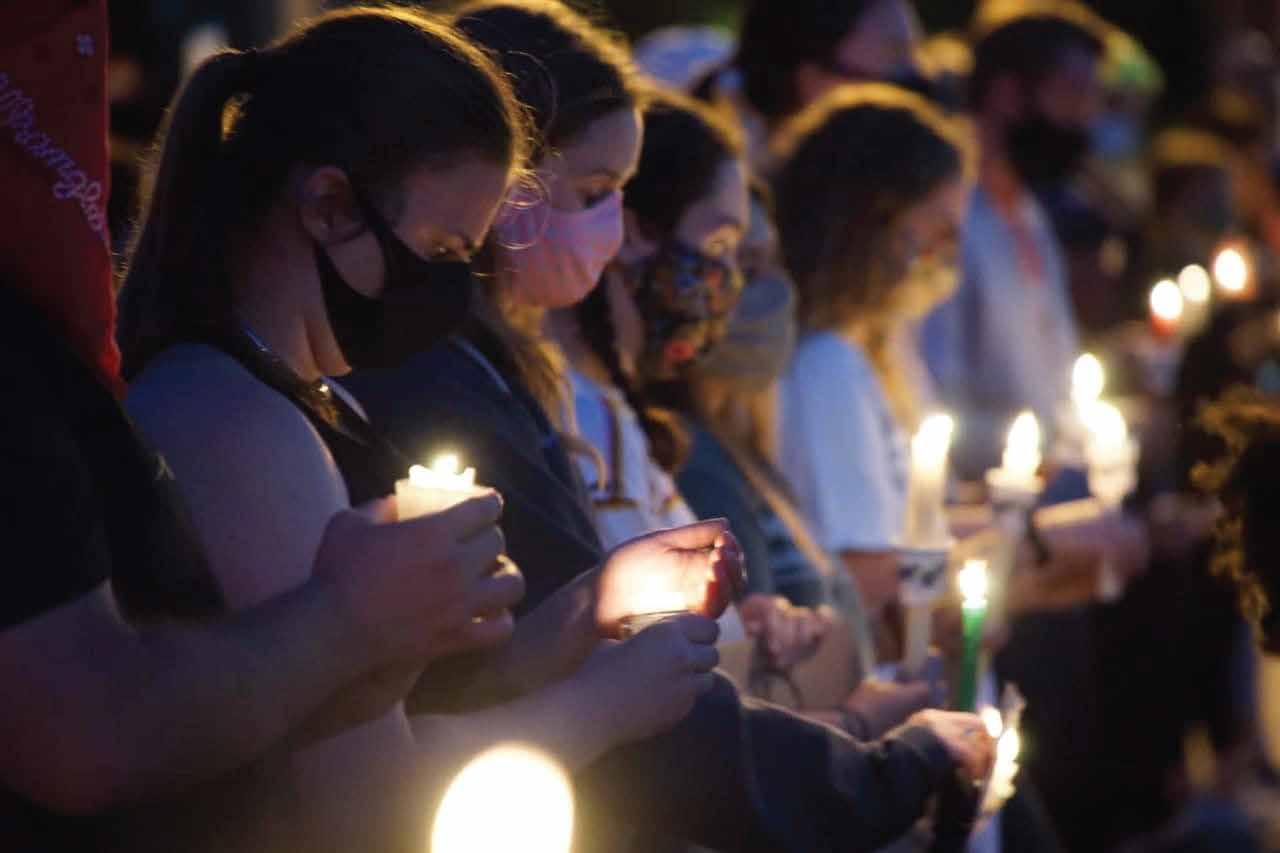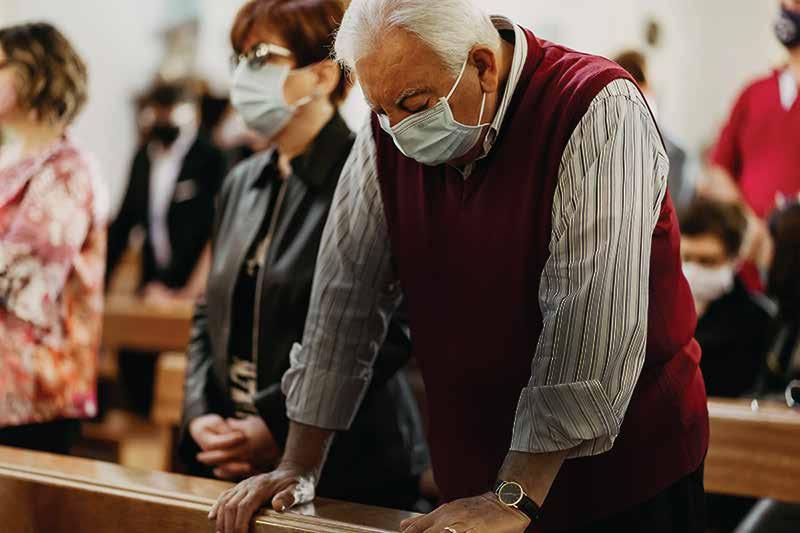
5 minute read
The Certain Hope of Resurrection
By Gwilym Tudur, Seion Congregational Church
Undoubtedly, 2021 has so far proven to be a difficult and challenging year for humanity. Whilst the rapid administration of the Covid-19 vaccine is certainly promising news, this dreadful virus continues to wreak havoc throughout the globe, afflicting pain, suffering, and death wherever it spreads. As was the case in 2020, this year has also been filled to its brim with tragedy, sadness, and darkness. The virus itself – as well as the extended periods of national lockdown caused in its wake – have taken their toll on our physical, mental, and spiritual wellbeing. Although we’re told to remain positive about the future, it is unclear how human optimism is nothing more than whistling in the dark. After all, our nebulous positivity is as incapable of stopping a future pandemic as it is of fixing a broken humanity and of saving a fallen world. Nevertheless, the poignant tone of the past few months has stirred within us a profound longing for something deeper, surer, and clearer than mere optimism. Our painful circumstances have provoked us to yearn intensely for a certain hope which can never falter or waver. Indeed, in an erratic year like 2021, we thirst for some genuine assurance to embolden us for the future.
The startling message of Easter is that such a hope exists. As Coronavirus continues to besiege humanity, the Bible reminds us that everlasting hope is found – not ultimately in the chambers of our parliaments, the laboratories of our universities, nor the hospitals of our cities – but in the crucified and risen Son of God, Jesus Christ. In him we find a sure hope which forgives our past, strengthens us in the present, and empowers us for the future. The Apostle Paul, in his first letter to the Corinthian Christians authored at Ephesus between AD 53 to 55, defines the nature of this glorious hope. He explains that Christian hope is not a groundless sentiment, but an absolute certainty established on the bodily resurrection of Jesus on the third day. The Christian faith itself and the hope it produces, the Apostle asserts, either stands or falls on the historical resurrection of Christ. Paul declares that if Jesus had not actually risen from death to life, our Christian preaching and faith are all but useless and vain (1 Corinthians 15:14). After all, for the Apostle, the resurrection was irrefutable proof that Christ’s sin-bearing death had been both effective and salvific (Romans 4:25). Throughout the New Testament, resurrection is not a vague notion that Christ metaphorically ‘rose’ in believers’ hearts; nor the abstract idea that Jesus figuratively ‘resurrected’ with the coming of the church; rather, it is the belief that – on one day in real, tangible history – the crucified Son of God miraculously began to breathe and walked out of his tomb alive. For Paul, the reality of Jesus’ resurrection is the sole anchor of our assurance.
If the risen Christ is the foundation of our hope, what is its object? Or, to phrase it in a different way, what does the Christian hope for? Paul, in his first letter to the Corinthians, reveals that our hope is that we will also, one day, resurrect like Jesus to be with him. He makes clear that since ‘Christ has indeed been raised from the dead’, he is the ‘firstfruits of those who have fallen asleep’ (1 Cor. 15:20). ‘Firstfruits’ were an early sample of a farmer’s crop which prefigured the quality of the season’s harvest. Paul’s point is

crystal clear: Jesus’ resurrection was the firstfruits of a future harvest, namely, the resurrection of every Christian at the end of time. The Apostle reiterates this theme again by asserting that ‘since death came through a man, the resurrection of the dead comes also through a man’ (1 Cor. 15:21). In other words, whilst death first devastated humanity through Adam, resurrection first came through Jesus: ‘For as in Adam all die, so in Christ all will be made alive’ (1 Cor. 15:22).
This is the essence of the Christian hope. Our certain confidence is that we – since we’re united by faith to Christ – will one day resurrect bodily and spend eternity enjoying him in the New Heavens and the New Earth (Revelation 21:1). On that glorious day when Jesus returns, God will finally abrogate the Fall and all of its terrible consequences. He will wipe every tear from our eyes and there will be no more sin, death, crying, mourning, or pain (Rev. 21:4). Cruel diseases, infectious viruses, and deadly pandemics will be banished irrevocably from God’s new creation. On that day, resurrected believers – as well as the cosmos we inhabit – will attain a perfection finer than Eden since our relationship with God will be fully restored.
This hope is not a utopian fantasy nor an idealistic pipe dream, but the authentic truth about the future. In fact, Christians can be as certain of their coming resurrection as they’re sure of Christ’s past resurrection on the third day. This is the hope we must share with our broken and hurting world, ravaged by a pandemic. Indeed, Christ commands us to share this hope with others by inviting our families, our friends, and our communities to trust him – his cross and resurrection – for their salvation. In comparison with superficial and shallow optimism, Christian hope is both authentic and unabating. This distinction between worldly optimism and Christian hope was encapsulated excellently by the late English theologian, J. I. Packer, in his Never Beyond Hope (2005):
Optimism is a wish without warrant; Christian hope is a certainty, guaranteed by God himself. Optimism reflects ignorance as to whether good things will ever actually come. Christian hope expresses knowledge that every day of his life, and every moment beyond it, the believer can say with truth, on the basis of God's own commitment, that the best is yet to come. (p. 15)
Originally from Cardiff, Wales, Gwilym became a Christian whilst reading the Gospel of Matthew as a teenager. Having studied at Aberystwyth University and the University of Oxford, Gwilym is now minister of Seion Congregational Church in the town of Aberystwyth, Ceredigion. He is married to Alexandra, who is originally from Romania, they enjoy reading, drinking tea, and going for long walks by the seaside.








